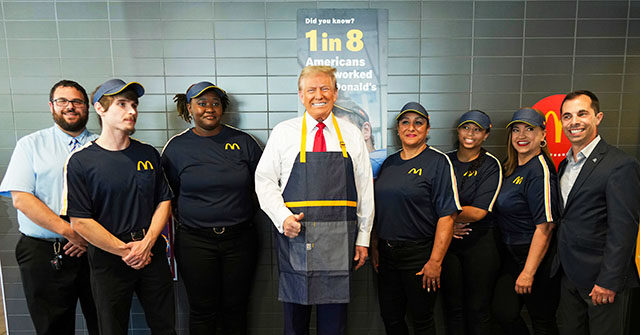Former President Donald Trump has been actively countering the perception of him as an authoritarian figure during his presidential campaign, and his recent engagement at a McDonald’s has played a pivotal role in this narrative. Filmmaker Dinesh D’Souza, known for his film “Vindicating Trump,” discussed this phenomenon during an appearance on Breitbart News Daily. D’Souza highlighted Trump’s inherent marketing skills and suggested that the former president’s actions are a deliberate strategy to connect with voters and dispel negative stereotypes surrounding him. Rather than embodying an authoritarian persona, Trump is positioning himself as a relatable figure, resonating with everyday Americans through gestures that many might view as unconventional for a billionaire.
D’Souza elaborated on how Trump’s branding efforts have been fundamental to his public image, stating, “Trump has always had this genius for marketing.” He argued that while Trump inherited his father’s real estate empire, it was Donald who truly established the Trump brand. This distinction underscores Trump’s ability to reinvent and promote himself, adapting to the political landscape in a way that resonates with a broad audience. D’Souza cited Trump’s recent viral moment at a Pennsylvania McDonald’s, where he donned an apron and served customers, showcasing an accessible, working-class persona that stands in stark contrast to the traditional image of a political candidate.
The McDonald’s incident served not only as a publicity stunt but also as a strategic move to challenge narratives surrounding his wealth and power. D’Souza pointed out the irony of a billionaire working in fast food as a compelling visual that refutes the serious authoritarian image often associated with Trump. He argued that such behavior starkly contrasts with typical depictions of dictators, who rarely engage in everyday activities in public. D’Souza confidently proclaimed, “Would a dictator, would a General Franco be caught at some tapas bar?” to emphasize that Trump’s actions are more aligned with an approachable leader rather than an authoritarian ruler.
D’Souza further commented on the emotional reactions of customers who encountered Trump at McDonald’s. He noted that their responses appeared spontaneous and genuine, enhancing Trump’s relatability and appealing to a sense of nostalgia for more straightforward, authentic political engagement. This emotional connection highlights Trump’s ability to forge bonds with voters, inviting them to see him as a relatable figure rather than a looming threat. D’Souza argued that such moments contribute positively to Trump’s standing among the electorate, as they showcase a softer side of the former president.
Overall, D’Souza posited that Trump’s marketing genius is helping to reshape public perceptions during an increasingly contentious election cycle. By embracing accessible, down-to-earth experiences like working at a fast-food restaurant, Trump is effectively undermining narratives that portray him as a threatening figure bent on undermining democratic principles. Instead, D’Souza contended that Trump represents a challenge to the established political regime rather than the constitutional order itself. The juxtaposition of Trump’s relatable antics against the backdrop of serious political discourse suggests a strategic intention to position himself as a disruptor of the status quo.
In conclusion, Trump’s recent actions exemplify a calculated strategy to redefine his public persona while appealing to the American electorate’s values. By engaging in relatable activities and showcasing a genuine connection with everyday citizens, Trump distances himself from the authoritarian labels placed upon him by critics. D’Souza’s analysis underscores the significance of this approach, suggesting that Trump’s return to the political arena is characterized by a concerted effort to dispel misconceptions and reclaim his narrative as a champion of the people rather than a tyrant. Ultimately, this dynamic illustrates the evolving nature of political campaigns in contemporary America, where personal branding and relatability can play a crucial role in shaping perceptions and garnering support.

